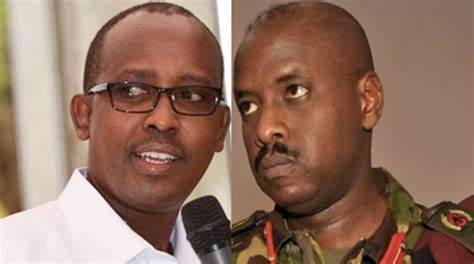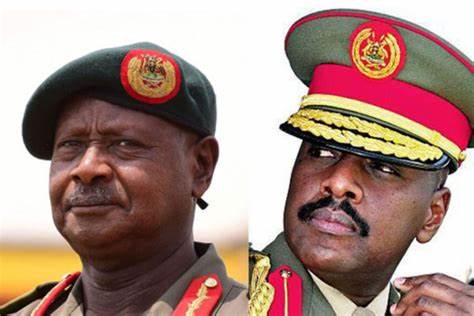The sordid power struggle within Uganda’s first family has laid bare the corrupt and self-serving nature of Museveni’s decades-long dictatorship. General Muhoozi Kainerugaba’s venomous attack on his brother-in-law Odrek Rwabwogo, branding him the “biggest thief” in Uganda, exposes the ruthless infighting at the heart of a regime that is more concerned with clinging to power than with the welfare of the nation. Muhoozi’s public outburst isn’t just family drama; it’s a stark reminder of the naked ambition and deep-seated greed driving this dysfunctional clan.
Rwabwogo’s sudden emergence as a potential presidential contender, with a suspiciously orchestrated support base calling for his candidacy, reeks of desperation. The so-called disciples of Rwabwogo demanding a “smooth transition” within the National Resistance Movement (NRM) are nothing more than pawns in a cynical game of power, a direct challenge to Muhoozi’s assumed birthright to the presidency. This unholy scramble for power within the Museveni family is a grotesque spectacle, revealing a regime that has lost its moral compass and is willing to sacrifice Uganda’s future on the altar of personal ambition.
Meanwhile, Museveni, the aging autocrat, remains conspicuously silent, allowing his family’s dirty laundry to be aired publicly. This silence is damning, suggesting that even he is unsure of how to navigate this treacherous terrain, torn between backing his power-hungry son or his equally ambitious son-in-law. The failure to clearly designate a successor has ignited this bitter and undignified struggle, further eroding the legitimacy of a regime that was already teetering on the edge of collapse.
As these power-hungry vultures circle, the real victims are the Ugandan people, who have become mere spectators to a drama that will decide their fate. The focus should be on uprooting the deep-seated corruption, poverty, and human rights abuses that have plagued Uganda for years, but instead, the nation is forced to witness the spectacle of a family tearing itself apart in its relentless quest for power.

In the end, whether it is Muhoozi or Rwabwogo who emerges victorious in this succession war, it is the ordinary Ugandans who will pay the price. This power struggle is a stark reminder that Uganda does not belong to its people but to a select few who trace their roots to Rwanda. The nation’s future is being bartered by those whose loyalty lies not with Uganda but with their own selfish ambitions, leaving Ugandans to wonder whether true change is even possible when their leaders are more interested in personal gain than in serving the nation.







Discussion about this post